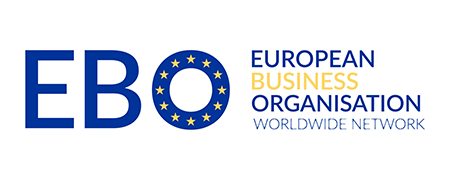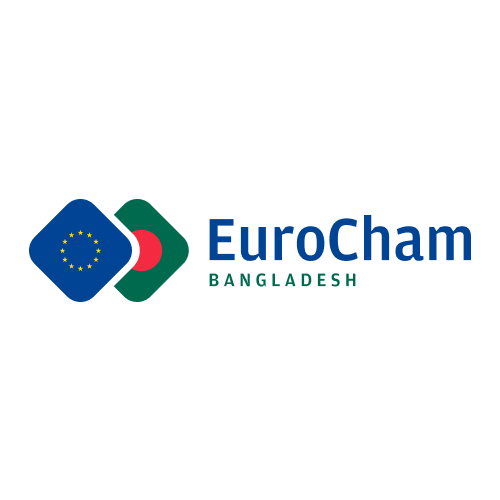European Union Chamber of Commerce in Bangladesh
The European Union Chamber of Commerce in Bangladesh (EuroCham Bangladesh) was launched on December 3, 2024, in Dhaka, marking a key step in strengthening economic ties between Europe and Bangladesh. Supported by the EU Delegation and EU Member States, EuroCham serves as a platform to promote trade, investment, and business relations between European companies and Bangladesh.
EuroCham aims to be the unified voice for European businesses in Bangladesh, fostering sustainable growth and a business-friendly environment. It facilitates dialogue with key government bodies, such as the Bangladesh Investment Development Authority (BIDA) and the National Board of Revenue (NBR), to improve the ease of doing business.
A core objective of EuroCham is to make the EU’s engagement in Bangladesh more dynamic and economically focused, helping to balance the growing influence of regional players like Japan, Korea, and China. The Chamber offers services like policy advocacy, business facilitation, and regulatory support, helping European companies navigate compliance, taxation, customs, and EU regulations.
In summary, EuroCham strengthens long-term economic ties between Europe and Bangladesh.
Services
EuroCham offers a comprehensive range of services to support its members' growth and success. These include organising networking events and business matchmaking to foster connections, providing training workshops to build capacity, offering advocacy support to influence policy in favor of businesses, and facilitating market access opportunities. EuroCham also provides legal and regulatory advice as well as logistical support, helping members navigate local and international markets effectively by leveraging its extensive network and expertise.
- Networking Events: Facilitating connections between businesses, policymakers, and stakeholders.
- Business Matchmaking: Identifying and linking potential partners for collaboration and trade.
- Training Workshops: Capacity-building sessions tailored to the evolving needs of member companies.
- Advocacy Support: Representing members' interests through policy dialogue and stakeholder engagement.
- Market Access Assistance: Supporting companies in entering and expanding into local and international markets.
- Legal and Regulatory Guidance: Providing insights into compliance, trade regulations, and local legal frameworks.
- Logistical Services: Assisting with practical aspects of doing business, including events and trade missions.
We also collaborate closely with the EU Delegation to organise events and programs that reflect the shared interests of European companies. This includes planning an annual calendar of initiatives aligned with private sector priorities and EU strategic goals‚ particularly in areas such as sustainability, circular economy, and innovation. Additionally, we work through thematic working groups to advocate for an improved business environment. Our focus includes promoting ease of doing business, addressing regulatory and discrimination issues, and enhancing the overall visibility and presence of the European private sector in host countries.
In essence, we offer comprehensive services aimed at supporting European businesses in thriving locally and internationally by leveraging the strength of the EBO network.
Advocacy & Policy Engagement
- EuroCham collaborates with policymakers to shape clear, effective regulations and policies, ensuring businesses have a stable and predictable framework for growth.
- Promoting transparency in business regulations.
- Engaging policymakers for fairer policies.
- Supporting regulatory compliance and improvements.
Ease of Doing Business Support
- EuroCham provides hands-on support to businesses, helping them navigate administrative and compliance processes for smooth operations.
- Streamlining taxation and customs procedures.
- Ensuring compliance with local and international requirements.
Trade & Investment Facilitation
- EuroCham bridges Europe and Bangladesh by fostering trade partnerships, offering insights, and enabling businesses to explore new markets.
- Building strategic partnerships to foster collaboration.
- Providing actionable market insights for informed decisions.
- Facilitating seamless cross-border trade and investment.
Membership Benefits
Key Benefits of EuroCham Bangladesh Membership
- Market Access & Trade FacilitationGain insights and guidance to enter BD market, expand operations, and confidently navigate trade barriers.
- Capacity Building & Knowledge SharingParticipate in exclusive workshops, training sessions, and seminars on trade regulations, sustainable practices, and digital transformation.
- Business MatchmakingConnect with potential partners through tailored matchmaking services, fostering collaboration and unlocking growth opportunities.
- Advocacy & RepresentationBenefit from EuroCham's role in facilitating dialogue between the private sector and key government stakeholders, such as the Bangladesh Investment Development Authority (BIDA), the Ministry of Commerce, and the National Board of Revenue (NBR), to improve the ease of doing business in Bangladesh.
- Policy Advisory & Regulatory UpdatesReceive advice on the impact of upcoming EU legislation on supply chains, including directives on corporate sustainability due diligence, textile strategy, circular economy, digital product passports, and eco-design for sustainable products.
- Networking & VisibilityAttend high-profile events organsed by Eurocham BD , providing opportunities to network with policymakers, industry leaders, and fellow businesses.
- Support for Sustainable DevelopmentEngage in initiatives aimed at facilitating Bangladesh’s green and digital transition, offering a platform for sharing know-how and promoting sustainable business practices. ​
Advocacy
EuroCham actively advocates for the interests of European businesses through a structured network of sector-specific and cross-sectoral committees. These committees focus on key areas such as trade, sustainability, digital economy, and regulatory affairs, among others. Through position papers, consultations, and regular dialogue with governments and international organisations, EuroCham ensures that the voice of European businesses is represented in policymaking processes. Its advocacy efforts aim to shape a favorable business environment and promote sustainable economic growth.
We are actively working to improve this area. Recently, we established dedicated working groups focused on logistics, taxation, profit repatriation and the removal of barriers to enhance trade between the EU and Bangladesh. We are also addressing cases of intellectual property (IP) infringement and prioritising the elimination of discriminatory practices against European companies and products. Logistic sector is heavily affected by local lobbying , we are strongly working on improving this.
In addition, we are expanding our focus to include sustainability-related requirements set by the EU, promoting sustainable energy solutions, and encouraging circular economy practices to support long-term, responsible trade and development. And showing the Authorities that there is a unique and strong voice representing the EU private sector concerns.



